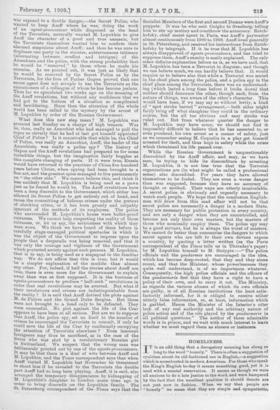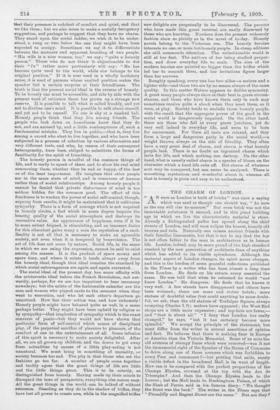HOMELINESS.
IT is an odd thing that a derogatory meaning has clung so long to the word " homely." There is often a suggestion of cynicism about its old-fashioned use in English,—a suggestion which is accentuated in modern American. For those who speak the King's English to-day it means something good, yet it is used with a mental reservation. It seems as though we were all anxious to do a late justice to the word, and were hampered by the fact that the excellent qualities it should denote are not just now in fashion. When we say that people are " homely " we mean that they are simple and sympathetic, that their presence is redolent of comfort and quiet, and that we like them; but we also mean to make a socially derogatory suggestion, and perhaps to suggest that they have no charm. They stand upon the social ladder, we wish it to be under- stood, a rung or two below the one they might have been expected to occupy. Sometimes we say it to differentiate between the manners and apparent breeding of two people. "His wife is a nice woman, too," we say; "quite a homely person." Those who do not think it objectionable to dot their " i's " rather more particularly will say: " He has become quite used to the world, while she belongs to his original position." If it is ever used in a wholly laudatory sense, it is used of persons whose exalted position makes the speaker feel a certain surprise at their friendliness. The truth is that the present social ideal is the reverse of homely. o be homely one must be accessible, and side by side with the present want of reticence there has grown up a strange new reserve. It is possible to talk what is called frankly, and yet not to disclose one's mind. It is possible to talk about oneself, and yet not to be oneself. No one is shy at a masked ball. Homely people think that they live among friends. The people who look down on homeliness know that they do not, and are amused by, and a little contemptuous of, such a fundamental mistake. They live in public,—that is, they live .among a crowd who elect to live together, and who have been eubjected to a process of selection by various alternative and very different tests, and .who, by reason of their consequent heterogeneity, have been obliged to substitute the forms of familiarity for the spirit of friendship, The homely .person is mindful of the common things of life, and is ready to speak of them and to show his real mind concerning them, whether they be sad or happy, of the last or of the least importance. He imagines that other people are in the same state of mind, and is conscious of .human: rather than of social relationships. Among homely people it .cannot be denied that private disturbance of mind is too lieldotn hidden for the common good. The effect of this frankness is to weaken the power of social self-control, though, arguing from results, it might be maintained that it cultivates sympathy. There is a form of courage which is not required in homely circles, a fact which in some degree impairs the bracing quality of the social atmosphere and destroys its recreative value. An appearance of happiness, even if it be to some extent feigned, is stimulating, and an innocent desire for this stimulant gains many a man the reputation of a snob. Reality is not all that is necessary to make an agreeable society, not even when it is tempered by benevolence. The art of life does not come by nature. Social life, in the sense in which we are using the expression, cannot be said to exist among the masses. It is the product of spare money and spare time, , and where it exists it tends always away from the homely ideal, though that ideal remains the standard by ,which social extravagances are again and again corrected. , The social ideal of the present day has some affinity with the aristocratic ideal before the French Revolution, not out- wardly, perhaps, for we are too impatient to bear ceremony nowadays; but the saints of the fashionable calendar are the men and women who played cards to the moment when they went to execution, and who let each other's departure go unnoticed. How fine their• action was, and how unhomely I Homely people might have behaved quite as well, in a sense perhaps better. They might have been upheld by religion or
by sympathy—that inspiration of sympathy which is the exact converse of panic—but they would not have shown that particular form of self-control which comes of disciplined play, of the perpetual sacrifice of pleasure to pleasure, of the
comfort of one to the entertainment of all. Some infusion of this spirit is necessary to make society delightful. After all, we are all grown-up children, and the desire to get away from actualities by means of a little play-acting is not unnatural. We must bring in something of unreality, or
society becomes too sad. The pity is that those who set the
fashions go too far. A. number of people come together and tacitly agree that the great things of life are little and the little things great. This is to be courtly, as distinguished from homely. Having made up their minds, to disregard the laws of perspective, everything else conies easy. All the great things in the world. can be talked of without reticence. Standing as they do in the shadow of trifles, they have lost all power to create awe, while in the magnified trifles new delights are perpetually to be discovered. The persons who have made this great reversal are easily discerned by those who are knowing. Nowhere does the present unhomely fashion show so plainly as in the novel of to-day. Homely novels belong to the Victorian era. The homely heroine interests no one, or none buthomely people. In cheap editions she still commands attention. The unfashionable woeld is still at her feet. The authors of her being studied propor- tion, and drew everyday life to scale. The sins of the modern heroine are painted no bigger than the trifles which led her to commit them, and her irritations figure larger than her sorrows. Roughly speaking, every one has two sides—a serious and a lighter .side—and these two are by no means always of the same quality. In this matter Nature appears to dislike symmetry. A great many people always show at their best in grave circum- stances, and those who have known them only in such may sometimes receive quite a shock when they meet them, as it were, at play. Society tends to exclude these homely people, with the result that the aggregate power of the, good in the social world is dangerously impaired. On the other hand, there are those who fail at every grave juncture, yet do very well indeed in everyday life, and seem to be born for amusement. For them all tests are relaxed, and they form a large and dangerous party in the social world,—a weight thrown always on the side of frivolity. They often have a very great deal of charm, and charm is what homely people lack. There is no doubt an ingrained charm which lasts for life, and which nothing can destroy. On the other hand, what i5 usually called charm is a species of bloom on the character which a hard life rubs off. But charm of whatever sort may be compared, but can never be analysed. There is something mysterious and wonderf iii about it, whereas all that is homely is plain and easy to be understood.










































 Previous page
Previous page